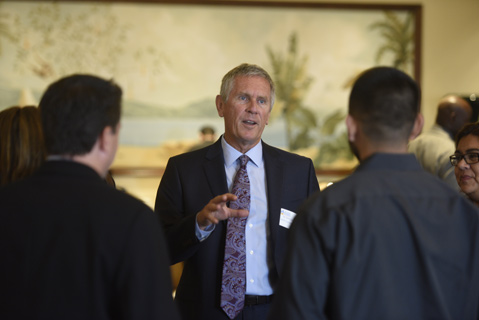Superintendent David Cash Announces Retirement
Polarizing School District Leader Will Leave Mixed Legacy

Four and a half years ago, Superintendent David Cash came into the Santa Barbara school district offices like a bull in a china shop. And that is putting it mildly.
This week’s abrupt announcement of his impending retirement also came as a surprise to many. Most thought he had one more school year — through the anticipated facilities bond initiative — left in him. But Cash, 60, never planned to stay in the position long. When he came on in 2011, he had already retired once before after stints in Clovis, Claremont, and Fullerton. Before that, he served as principal of Buellton Union, Goleta Valley Junior High, and Dos Pueblos schools, and he returned to the area to throw spaghetti against the wall to see what would stick.
Cash is a polarizing figure; people love him or hate him. Critics called his personality combative, brash, and arrogant. But supporters said he gets things done and cares about students while demanding accountability from his teachers.
When he started, he spoke openly of the haves and the have-nots and addressed inequality head-on. He pushed teachers to be more “culturally proficient,” or more in tune to families who do not speak English as a first language. He emphasized hiring Spanish-speaking teachers. In the last year, he boasted that the district hired more than 20 teachers who once attended Santa Barbara schools.
Under his tenure, scores of English Language Learner (ELL) students were reclassified, strengthening their college and career eligibility. Last school year, 1,017 students were reclassified — nearly triple that of the previous year. And this year, for the first time, Cash said recently, the district counted an equal number of English-as-a-second-language and English-only students in the GATE program.
He rolled out restorative justice, known as Restorative Approaches in the school district, and dramatically reduced suspensions, a philosophy more recently employed statewide. When asked about the challenges the program poses for teachers — stopping class rather than sending disruptive students to the principal’s office — Cash was adamant that kids missing class time greatly harms students in the long run. Focus groups, he added, are in progress to accumulate staff and student data.
Cash speaks boldly and sternly. At the recent State of the Schools address, he projected high school drop-out rates on the screen: 3.6, 8.2, 7.2 percentages at Dos Pueblos, San Marcos, and Santa Barbara high schools, respectively. “That sucks,” he said after a dramatic pause. “That represents kids who started with us in 9th grade … by the time their peers got to graduation in June in 12th grade, they weren’t there.” He juxtaposed those figures against the Advanced Placement (AP) passage rates: 65 percent, on average, district-wide. “That’s awesome,” he said equally as dramatically.
Before Cash took the helm, school board meetings regularly lasted until 11 o’clock at night. Now, they are done at 9. There is rarely a split vote at meetings, and Cash becomes visibly flushed in the face of public criticism.
“Dr. Cash doesn’t like disharmony,” school board president Ed Heron noted. Heron, who praised Cash’s decisiveness, passion, and vision, noted that five years is an average to long time for the job of superintendent. The school board last evaluated Cash’s on-the-job performance last December.
Under the Common Core State Standards, teachers are not using textbooks, and they often carry the burden to create lesson plans. Cash said in an interview no decision has been made about textbooks in the future, noting there is an ongoing debate about whether a “Common Core textbook” even exists. The decision, he noted, is up to the school board.
Several of his critics interviewed for this story declined to go on the record for fear of backlash. In fact, at a recent school board meeting, Heron said he has heard “time and time again” for eight years that retaliation takes place at the school district. “Rightfully or wrongfully,” he said, “there is a feeling.”
Turning to the audience, Cash shot back: “I want to make it clear that under no circumstance will any staff member be allowed to or tolerated to retaliate against anyone for publicly voicing a concern.”
Heron added: “And I want to be equally clear that for over eight years I’ve heard it.”
At first blush, this imperious attitude makes Cash seem an emperor ruling a kingdom. But insiders note Cash demands the best from his staff; they, too, are expected to own their work. Employees are held accountable, and as a result, a culture centered on children rather than adults has prospered. When asked about future plans, Cash said he wants to strengthen voices in the community he believes are too quiet. As to who these voices are, he declined to say.



